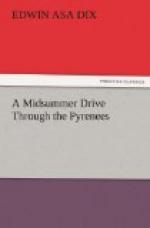Few of the race are to be found in these happier days; the old laws were softened during the first quarter of the eighteenth century, and the Revolution did away with them altogether. The Cagots as a separate tribe have gradually disappeared or been absorbed. Yet the antipathy to the name and the tribe even to-day in some of these regions, though now chiefly a tradition, is still alive and implacable. M. Ramond, the Saussure of the Pyrenees, carefully studied these outcasts over seventy-five years ago, and made this touching statement concerning them:
“I have seen,” he wrote, “some families of these unfortunate creatures. They are gradually approaching the villages from which prejudice has banished them. The side-doors by which they were formerly obliged to enter the churches are useless, and some degree of pity mingles at length with the contempt and aversion which they formerly inspired; yet I have been in some of their retreats where they still fear the insults of prejudice and await the visits of the compassionate. I have found among them the poorest beings perhaps that exist upon the face of the earth. I have met with brothers who loved each other with that tenderness which is the most pressing want of isolated men. I have seen among them women whose affection had a somewhat in it of that submission and devotion which are inspired by feebleness and misfortune. And never, in this half-annihilation of those beings of my species, could I recognize without shuddering the extent of the power which we may exercise over the existence of our fellow,—the narrow circle of knowledge and of enjoyment within which we may confine him,—the smallness of the sphere to which we may reduce his usefulness.”.
V.
Coming out again upon the street, we stray down into one of the shops,—a shop local and naive, a veritable French country-store. We have noticed the hemp-soled sandals worn by many of the mountaineers, and incline to test them for the approaching excursion to Gavarnie. The dark-eyed little proprietor and his wife spring to greet us; foreign customers, especially English or American, are with them a rare sight,—St. Sauveur, a mile away, being a more usual stopping-place for travelers than Luz; and soon the floor is littered with canvas-topped footwear, solicitously searched over for the needed sizes. A running fire of conversation accompanies the fitting. They show the usual French interest in ourselves and our country; we enlarge their views considerably on the latter score, though heroically refraining from romancing. They make a fair livelihood from their store, they inform us; many farmers and peasants outside of the village come to buy at Luz. In fact, the small shopkeepers such as these are generally the prosperous class in a place like Luz, though the standard of prosperity might not coincide with that of the cities. But as compared with that of their customers among the peasantry of the district, it seems to include not only necessity but comfort.




